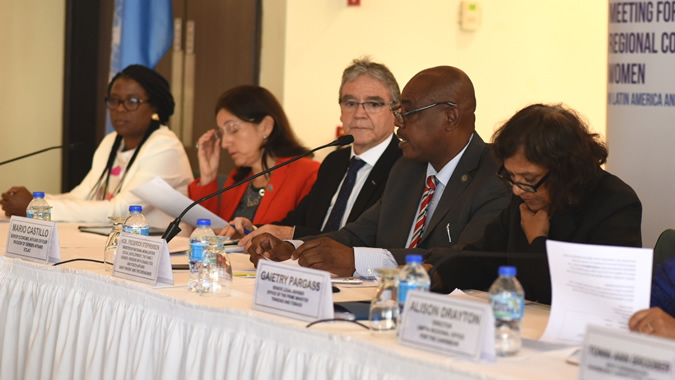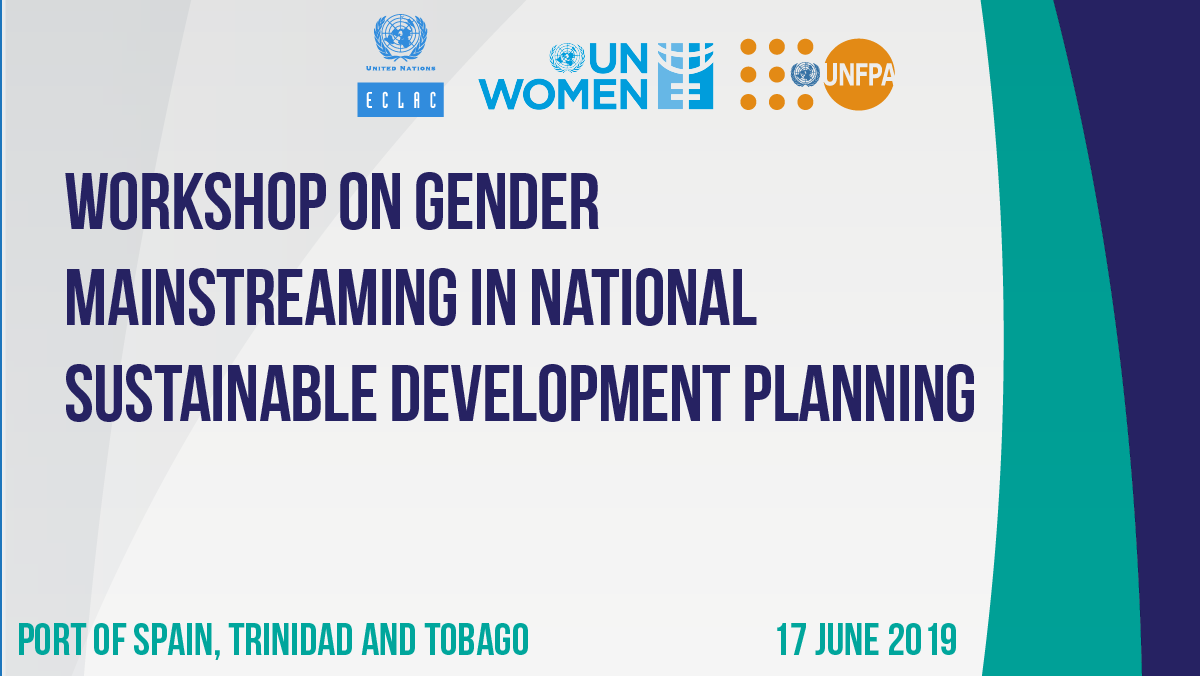ECLAC Subregional Meeting Examines Progress and Challenges in the Caribbean in Preparation for the XIV Regional Conference on Women
Work area(s)
Government officials and experts from across the Caribbean participated in the event held in Port of Spain, Trinidad and Tobago.

Government officials and experts from across the Caribbean participated in the subregional preparatory meeting of the XIV session of the Regional Conference on Women in Latin America and the Caribbean, an ECLAC subsidiary body, held in Port of Spain, Trinidad and Tobago on 18 June 2019, to examine progress as well as obstacles for advancing women’s autonomy and gender equality in the context of the Caribbean’s changing economic scenarios.
The event was organized by the Economic Commission for Latin America and the Caribbean (ECLAC) subregional headquarters for the Caribbean and ECLAC’s Division for Gender Affairs as the Technical Secretariat for the Regional Conference on Women, in partnership with UN-Women and the United Nations Population Fund (UNFPA), and recorded the participation of more than 17 ECLAC member countries, including Anguilla, Bahamas, Barbados, Belize, British Virgin Islands, Cayman Islands, Chile, Dominica, Grenada, Guyana, Jamaica, Saint Kitts and Nevis, Saint Lucia, Saint Vincent and the Grenadines, Sint Maarten, Trinidad and Tobago and Turks and Caicos Islands, as well as several agencies of the UN system, members from civil society organizations and academia.
Welcoming government officials and experts from across the Caribbean, Gaietry Pargass, Senior Legal Adviser in the Office of the Prime Minister of Trinidad and Tobago, underscored that “over the past five years, Trinidad and Tobago has strengthened its legal, policy and programmatic frameworks in its efforts to achieve gender equality, more specifically, its initiatives towards the dismantling of structural barriers that impede gender equality”.
Janey Joseph, Director of Gender Relations of Saint Lucia, read a statement sent by the President of the Regional Conference on Women, Mariella Mazzotti, in which she welcomed the participants and invited a fruitful debate to reflect on the contributions of Caribbean countries towards the full implementation of the Montevideo Strategy.
During the meeting, senior government, UN and regional organization representatives, non-governmental organization officials and civil society leaders discussed the importance of implementing effective measures to eliminate gender-based violence and to increase women’s access to political institutions, in addition to creating new employment opportunities for women, reducing poverty and addressing the specific vulnerabilities of women to climate change and natural disasters.
The event also provided a venue to celebrate the Caribbean Girls Hack 2019 Hackathon initiative, and to celebrate its winners. The initiative aimed at engaging young girls in interactive, fun and problem-solving experiences using technology, whilst empowering them to pursue studies and careers in ICT. Diane Quarless, Director of the ECLAC subregional headquarters for the Caribbean, congratulated the winners and highlighted that “accelerating the access to and participation of women and girls in science, technology, engineering and mathematics education and employment must increasingly become part of the solution that the Caribbean pursues, if our subregion is to achieve sustainable development with equality by 2030.”
Further emphasizing these sentiments, the Hon. Frederick Stephenson, Minister of National Mobilization, Social Development, The Family, Persons with Disabilities and Youth of Saint Vincent and the Grenadines noted that the Girls Hack 2019 Hackathon initiative “was a competition intended to raise the level of interest in and awareness of girls in ICT, where girls from these countries had the opportunity to pitch tech-based solutions to address two pressing issues in the Caribbean, namely gender-based violence and building resilience to climate change”.
Another highlight of the meeting were the presentations delivered by country representatives from the British Virgin Islands, Grenada, Guyana, Saint Lucia and Turks and Caicos Islands, who illustrated the progress made and challenges faced at the national level in the implementation of the Beijing Declaration and Platform for Action, 25 years after its adoption, and of the Montevideo Strategy for Implementation of the Regional Gender Agenda within the Sustainable Development Framework by 2030.
The Minister of Women and Gender Equity of Chile, Isabel Plá, was represented at the meeting and sent a message inviting Caribbean governments to the XIV Regional Conference on Women in Latin America and the Caribbean to be hosted in Santiago, Chile, from 4-8 November. The representative shared Chile’s public policy initiatives for advancing gender equality in the country and welcomed participants to present their contributions in the upcoming conference.
Additionally, a Workshop on Gender Mainstreaming in National Sustainable Development Planning was held on the eve of the subregional preparatory meeting. It focused on the tools, methodologies and strategic approaches for mainstreaming gender in national development planning.
Addressing the Workshop, the Hon. Ayanna Webster-Roy, Minister of State in the Office of the Prime Minister of Trinidad and Tobago, noted that “by actively pursuing gender mainstreaming our nations can clearly identify issues negatively impacting all sectors of our everyday lives and position citizens to become active contributors and promoters of national development strategies”.
Related content

Caribbean preparatory meeting of the XIV session of the Regional Conference on Women in Latin America and the Caribbean
The Caribbean preparatory meeting of the XIV session of the Regional Conference on Women in Latin America and the Caribbean is convened in accordance with the agreements adopted at the fifty-eighth…

Workshop on Gender Mainstreaming in National Sustainable Development Planning
ECLAC Caribbean, in collaboration with ECLAC Division for Gender Affairs, convenes the Workshop on Gender Mainstreaming in National Sustainable Development Planning for technical experts and…
Related event

Subregional headquarter(s) and office(s)
Type
Country(ies)
- Latin America and the Caribbean
- Caribbean
-
Trinidad and Tobago
Contact
Public Information Unit
- prensa@cepal.org
- (56 2) 2210 2040
